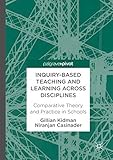Inquiry-Based Teaching and Learning across Disciplines [electronic resource] : Comparative Theory and Practice in Schools / by Gillian Kidman, Niranjan Casinader.
Material type: TextPublisher: London : Palgrave Macmillan UK : Imprint: Palgrave Pivot, 2017Description: XXII, 159 p. 14 illus. online resourceContent type: text Media type: computer Carrier type: online resourceISBN: 9781137534637Subject(s): Education | International education | Comparative education | Curriculums (Courses of study) | Education -- Curricula | Science education | Educational sociology | Education and sociology | Sociology, Educational | Education | International and Comparative Education | Curriculum Studies | Science Education | Schools and Schooling | Sociology of Education | Sociology of EducationAdditional physical formats: Printed edition:: No titleDDC classification: 370.116 | 370.9 LOC classification: LB43Online resources: e-book Full-text access
TextPublisher: London : Palgrave Macmillan UK : Imprint: Palgrave Pivot, 2017Description: XXII, 159 p. 14 illus. online resourceContent type: text Media type: computer Carrier type: online resourceISBN: 9781137534637Subject(s): Education | International education | Comparative education | Curriculums (Courses of study) | Education -- Curricula | Science education | Educational sociology | Education and sociology | Sociology, Educational | Education | International and Comparative Education | Curriculum Studies | Science Education | Schools and Schooling | Sociology of Education | Sociology of EducationAdditional physical formats: Printed edition:: No titleDDC classification: 370.116 | 370.9 LOC classification: LB43Online resources: e-book Full-text access | Item type | Current library | Collection | Call number | Copy number | Status | Notes | Date due | Barcode |
|---|---|---|---|---|---|---|---|---|
| E-Books | MEF eKitap Kütüphanesi | Springer Nature | LB43 (Browse shelf (Opens below)) | Available | NATURE | 1420094-1001 |
PART I -- Chapter 1. The Unfolding of Inquiry in Education: A Research Chronology -- Chapter 2. Managing the Reins of Inquiry: The Role of the Teacher in IBL -- Chapter 3. Differences in Perspective: The Impact of Culture on Inquiry -- PART II -- Chapter 4. Inquiry in the Australian Curriculum: Commonalities and Dissonances -- Chapter 5. Pebbles in a Pond: The Initiation of Inquiry -- Chapter 6. Through the Looking Glass: The Conduct of Inquiry -- Chapter 7. Building the Foundation: The Use of Data and Evidence in Inquiry -- Chapter 8. The Evaluation of Inquiry: The End of the Road? -- Chapter 9. 'Intelligence in the Wild': Inquiry in the Field.
This research-based book dissects and explores the meaning and nature of Inquiry in teaching and learning in schools, challenging existing concepts and practices. In particular, it explores and contests prevailing attitudes about the practice of inquiry-based learning across the Science, Geography and History disciplines, as well as focusing on the importance of the role of teacher in what is frequently criticised as being a student-controlled activity. Three frameworks, which are argued to be necessarily intertwined for discipline-specific literacy, guide this inquiry work: the classroom goals; the instructional approach; and the degree of teacher direction. The foundation of the analysis is the notion of educational inquiry as it is structured in the Australian Curriculum, along with the locating of the study in international trends in inquiry learning over time. It will be of great interest to researchers, higher degree students and practicing professionals working in Education and Sociology. .
5
